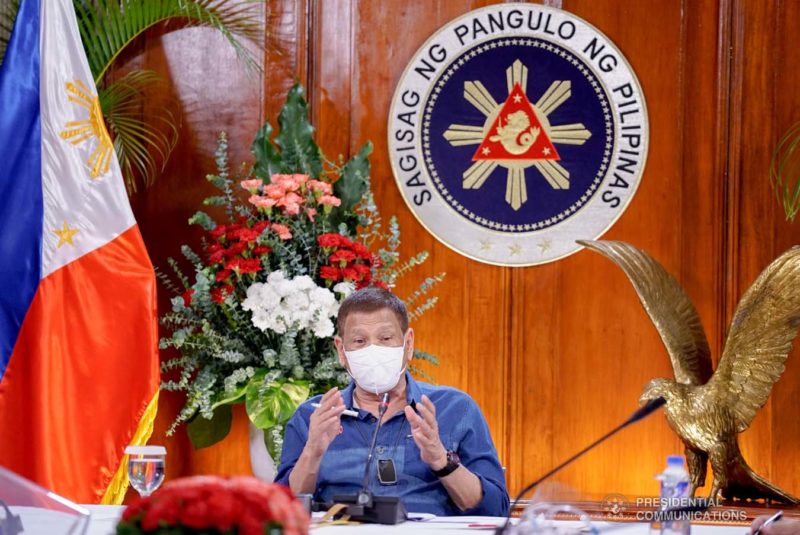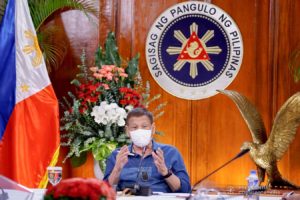

The National Capital Region (NCR) and the Luzon provinces of Laguna, Cavite, Rizal and Bulacan will revert to modified enhanced community quarantine (MECQ) from general community quarantine (GQ) effective August 4, 2020 until August 18.
President Rodrigo Duterte made the announcement in a late night public address on August 2 amid calls from various medical associations to revert to ECQ for two weeks in order for the government “to recalibrate strategies against COVID-19.”
In calling for an ECQ the healthcare groups said the Philippines’ healthcare system is overwhelmed and healthcare workers are experiencing burnout from handling the growing number of COVID-19 cases, which topped an alarming 106,000 on August 3.
NCR and other areas in the country were placed in June under GCQ, a more relaxed form of community quarantine than MECQ. Last July 31, Duterte had announced that these places would remain under GCQ until August 15.
In reverting to MECQ, work and quarantine passes will again be required to minimize movement of people and contain the spread of the highly communicable disease.
MECQ is a less restricted form of ECQ that allows limited movement within zone for obtaining essential services and work; operation of selected manufacturing and processing plants at a maximum of 50% capacity; limited transporting services for essential goods and services; and suspension of physical classes.
Under the omnibus guidelines as of July 16, places under MECQ should observe strict home quarantine, and movement of all residents will be limited to accessing essential goods and services.
Law enforcement agencies should recognize any of the following IDs: IATF IDs issued by the regulatory agencies with jurisdiction over permitted establishments or persons, bona fide IDs issued by establishments exempted from the strict home quarantine requirement, or RapidPass IDs.
No other IDs or passes specifically exempting persons from community quarantine should be required of workers of permitted establishments and/or offices without prejudice to requiring the presentation of other documents establishing the nature of their work.
The movement of cargo vehicles should still be unhampered. Cargo vehicles as well as vehicles used by public utility companies, business process outsourcing (BPO), and export-oriented establishments should not be subject to an ID system.
100% and 50% operational capacity only
Activities and businesses allowed to operate at 100% capacity are:
- Agriculture, forestry, and fishery
- Manufacturing of essential goods
- Essential retail
- Food preparation insofar as take-out and delivery services
- Water-refilling stations
- Laundry services (including self-service)
- Public and private hospitals
- Other medical, dental, rehabilitation and optometry clinics, non-aesthetic dermatological clinics, EENT
- Logistics service providers (cargo handling, warehousing, trucking, freight forwarding, and shipping)
- Delivery and courier services, whether in-house or outsourced transporting food, medicine, or other essential goods, including clothing, accessories, hardware, house wares, school and office supplies, as well as pet food and other veterinary products
- Water supply and sanitation services and facilities, including waste disposal services, as well as property management and building utility services
- Establishments engaged in repair and maintenance of machinery and equipment, including those in the repair of computers and household fixtures and equipment
- Telecommunications companies
- Energy and power companies
- Gasoline stations
- Workers accredited by the Department of Transportation to work on utility relocation works, and specified limited works across 13 railway projects, including replacement works for the Metro Manila Rail Transit System Line 3
- Airline and aircraft maintenance, pilots and crew, and employees of aviation schools for purposes of the pilot’s recurrent training for flight proficiency and type rating using simulator facilities; and ship captains and crew, including shipyard operations and repair
- Essential public and private construction projects
- Manufacturing companies and suppliers of equipment or products necessary to perform construction works, such as cement and steel
- BPO and 100% export-oriented companies, including mining and quarrying
- Printing presses authorized by the BIR or other appropriate agencies to print official receipts and other accountable forms
- Media establishments
- E-commerce companies
- Postal, courier and delivery services for articles or products other than food, medicine, or other essential goods, including clothing, accessories, hardware, house wares, school and office supplies, as well as pet food and other veterinary products
- Rental and leasing, other than real estate, such as vehicles and equipment for permitted sectors
- Housing service activities, such as but not limited to plumbing, roofing, and electrical works
- Veterinary activities
- Security and investigation activities
- Funeral and embalming services
- Banks, money transfer services, pawnshops, microfinance institutions, and credit cooperatives
- Capital markets
- Employment activities that involve recruitment and placement for permitted sectors
Allowed to operate at 50% capacity are:
- Other manufacturing industries classified as beverages, including alcoholic drinks; electrical machinery; wood products and furniture; non-metallic products; textiles and clothing/wearing apparels; tobacco products; paper and paper products; rubber and plastic products; coke and refined petroleum products; other non-metallic mineral products; computers, electronic and optical products; electrical equipment; machinery and equipment; motor vehicles, trailers and semi-trailers; other transport equipment; and others
- Other real estate activities
- Administrative and office support such as, but not limited to, providing photocopying and billing services
- Other financial services such as, money exchange, insurance, reinsurance and non-compulsory pension funding
- Legal and accounting services
- Management consultancy services or activities
- Architectural and engineering activities, including technical testing and analysis
- Science and technology, and research and development
- Recruitment and placement agencies for overseas employment
- Advertising and market research
- Computer programming and information management services
- Publishing and printing services
- Film, music and television production
- Photography, fashion, and industrial, graphic and interior design
- Wholesale and retail trade of vehicles and their parts and components
- Repair and maintenance of vehicles as well as its parts or components, including car wash services
- Malls and commercial centers
- Dining establishments and restaurants, but for delivery and take-out only
- Hardware stores
- Clothing and accessories
- Bookstore and school and office supplies
- Baby or infant care supplies
- Pet food and pet care supplies
- Information technology, communications and electronic equipment
- Flower, jewelry, novelty, antique and perfume shops
- Toy stores
- Firearms and ammunition trading establishments
- Pastors, priests, rabbi, imams, and other religious ministers insofar as providing home religious services to households. Provided that proper protocols are observed




